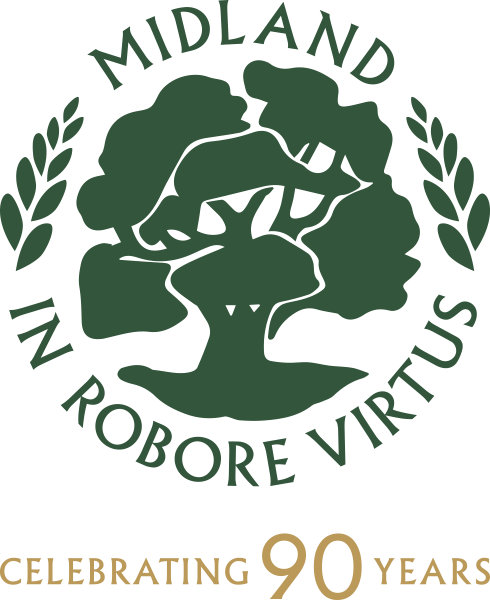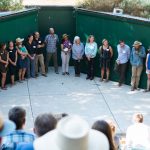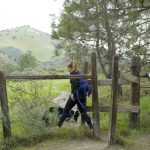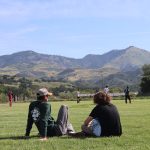One of the things we are most grateful for here at Midland is the active engagement and support we receive from you, our extended community. Your questions, stories and insights are crucial to ensuring Midland evolves in a thoughtful, authentic way that is consistently rooted in our central mission. Throughout our campus and strategic planning process, we’ve had the privilege of hearing (and answering) a large spectrum of questions about the future of Midland.
Below, we’ve done our best to answer some of the most commonly asked questions that have come our way through one-on-one meetings, gatherings, over Thanksgiving meals and in conversation on our hiking trails. If you have any further questions or would simply like to learn more about the projects, please get in touch!
Your Questions, Answered:
Q: The pan-abode cabins were a cornerstone of my Midland experience! Why couldn’t we just move the old ones to new locations?
A: Moving them triggers a requirement to bring them “to code” and, in particular, the seismic requirements are expensive and would have required internal bracing, making them effectively even smaller. Read more about student cabins
Q: What role will students play in this era of campus renewal projects?
A: Though more challenging today due to new rules and regulations — and heightened pressures on student time due to a drastic increase in college-preparatory graduation requirements — our students have consistently been involved in the campus renewal and construction projects. Students were actively involved in the campus planning process, dating all the way back to the 2013 Walker Macy Campus Plan. This spring, our sophomore class spent a week completing the demolition of three upper yard cabins, and our seniors began repurposing the cedar pan-abode wood in that same week to build a platform on the newly built Bobcat Bend trail (connecting Res Road and Rain Gauge Trail) to house a Hardluck Yurt. We hope to create similar hands-on woodworking and construction projects for our students over the next steps of the campus renewal process. Read about student engagement in the demo of Upper Yard pan-abodes (scroll to Student Engagement section at the bottom!)
Q: Why does Midland need new bathrooms?
A: Often at Midland we find that there is a fine line between rustic and rundown. We attract prospective students and families with a rustic, needs vs. wants campus aesthetic. We lose prospective students and families due to run-down and malfunctioning facilities, such as student bathrooms. Much of our core infrastructure requires replacement (sewer and water lines) making ongoing maintenance and repair cost prohibitive.
Q: How will Midland strike a balance between simple and fancy?
A: Simplicity is always at the foundation of our campus renewal projects. By keeping the forms, construction and materials simple themselves — with a thoughtful commitment to durability and cost efficiency — we are able to maintain Midland’s rustic and simple aesthetic. Though updated, our campus will continue to feel “alternative to the regular thing.”
The Big Question: Showerfires
Q: Why couldn’t we keep some form of showerfires in the student bathrooms?
A: Showerfires have been central to Midland’s way of life and identity since 1932. We have cherished the simplicity, work ethic, interdependence, and simple cause-and-effect lessons inherent in the practice of giving every Midland student, from time to time, responsibility for meeting an essential need of our community. The question of whether showerfires could/should continue at Midland goes back more than 15 years, to the earliest community and alumni workshops informing the Campus Plan process, and has been discussed and debated in numerous sessions since then. Throughout this long period of study and deliberation, it has slowly, inexorably, become more and more clear that the technical, ethical, and legal realities of the present day have finally made it mandatory that we face the unfortunate need to develop other ways of teaching the lessons and sharing the responsibilities that showerfires have taught since Midland’s inception.
At Midland’s Board of Trustees winter meeting, after long and serious deliberation, the Campus Committee recommended to the full Board that showerfires and cabin fires not be included in our current campus planning. With suitable sadness, and also a sense of serious responsibility, the full board voted unanimously to accept that recommendation
New codes make shower fires virtually impossible
Wood-burning fires are not a Mechanical/Plumbing Code allowed heating source for water, so a fully-functional boiler system and solar system is required, and thus any showerfire system must be separate and redundant. This redundancy, complexity and added expense to have a separate showerfire system and structures to house them has been generally seen as in conflict with Midland’s ethos of straightforward simplicity and “needs not wants.”
Code mandated technical issues would require expensive and complex solutions
Code-required temperature control of hot water makes integration of showerfire hot water as secondary/supplementary to a conventional system technically complex/problematic and would be expensive to design and install. “Needs not Wants” led to a consolidated bathroom building in upper yard, minimizing costs and consolidating the building footprint where spaces are tight. A consequence of this is a demand that any showerfire solution would have to integrate into a much larger system.
Solar thermal plus shower fires?
We have confirmed that solar thermal plus showerfires would not meet code. Fire as a primary heat source is not allowed by code, and solar-only is not code-compliant either — so the boiler is required. Also the integrated solar hot water system pre-heats water in the storage tanks that then gets topped off as needed by the boiler via a sensitive thermostatic mixing valve to achieve required water temperatures. Due to a host of complexities in how the piping and controls function, that system cannot be directly integrated with a Midland-style showerfire type of system
Regulatory risks
If a supplementary wood-burning water heating source were added by Midland School post–restroom construction, the County’s Air Pollution Control District would have the authority not to allow Midland to use it if the APCD were to determine in the future that the burning of wood were a nuisance to local air quality. They could show up any day and deliver that news, but with the campus renewal in progress and on the drawing board the chances are much higher.
Climate change makes shower fires morally and ethically questionable
Wood burning has one of the highest carbon footprints as a means of heating water, which is not a good fit with Midland’s strong environmental ethos. We are, however, planning integrated rooftop solar water heating systems that integrate well with the building plumbing and will minimize the use of propane for water heating.
How does this relate to cabin wood stoves?
Similar logic comes into play when considering wood burning stoves in the cabins. Code requires mechanical heating, so adding redundant heat from wood burning stoves would not fit our simplicity and needs-not-wants ethos. In addition, the insulation levels required by code mean that a redundant wood heat system would be quickly excessive and rarely necessary in cabins this size.
Have further questions?
Continue Exploring Midland's Campus Renewal Plan








